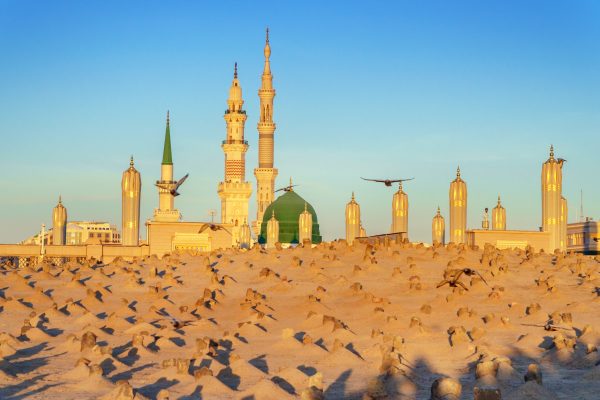Challenges present an explicit impetus towards activity and towards mobilizing our inner consciousness, but at the same time, it also requires enough seriousness in dealing with those challenges we encounter in our lives on a daily basis. They test our competence, our will power, and our dedication to strive, and if not met with the appropriate responses, disorder will follow and inadvertently affect one’s competence, will power, ability to strive, and eventually self-respect.
This can also be explored in the context of Islam and our Muslim youth, who also suffer from numerous challenges of social, political, ethical, and religious understandings. The first imminent challenge for the Muslim youth of today is in the understanding of their environment, and how they allow their environment to harness their traits and their natural abilities. This is why Islam places such a high emphasis on the concept of child psychology and the way children are brought up, which is something parents have to take into serious consideration.
Recent psychological studies have also shown how the early environment of a child affects his/her later stages of development in the adolescence period, with Alfred Bandura’s Observational Learning and Modeling theory also stating that the parent’s actions and words act as a model for the child’s future learning.
Good upbringing by the parents (which can include cultivating good habits, discipline, self-control, kindness, respect for others, time management, and good communication) along with the intrinsic values of Islam will definitely help our Muslim youth in understanding their environment when they enter into the later stages of life.
The scary reality: How social & popular media is desensitising our youth (part 1)
A second challenge the Muslim youth face today is a political one in the misrepresentation, misinterpretation, and even misquotation of Islam. Western media plays a central role in this challenge, by escalating irrelevant debates and creating a feeling of distress and alienation among Muslim youth. The spread of Islamophobia after 9/11 added fuel to the fire in distressing Muslim youth across the world, and with the recent brutal and gruesome attack on the two mosques in Christchurch, New Zealand, Muslim youth have had to reconcile and deal with terms like fundamentalism, extremism, and Islamic radicalism.
This is an ongoing mess where the Muslim youth need to come forward actively, engage with people who are both knowledgable and diverse, and help understand and research the true teachings of Islam as enshrined in Quran and hadith. This challenge points towards another issue faced by the young Muslim community, in that it can be difficult to understand all the numerous Islamic political schools of thought, social systems of Islam, the modern relevance of Islamic thought, the history of Islam, the concept of jihad in Islam, and the rights of women in Islam to just name a few. Until the Muslim youth are well equipped with the knowledge required to comprehend these areas, they will be marginalised, suppressed intellectually, and even made passive in every possible manner.
The third challenge for the Muslim youth, therefore, is to deal effectively with shifting through the different claims on hadith (sayings and approvals of Prophet PBUH), Islamic history and tradition, and the so-called “Golden Age” of Islam which included the intellectual awakening that happened during the Abbasid period of Islam with research in the fields of science, philosophy, astronomy, mathematics, astrology, geography, and medicine. The Muslim youth should derive inspiration from such periods, and understand how they have contributed to our world today instead of glorifying an age without truly understanding it.
Understanding historical personalities is part of the key to truly appreciating and learning from our past. How many of us know Ibn Haytham (who explored the fields of physics, optics, and astronomy), Ibn Khaldun (a sociologist and political philosopher), or Al-Khwarizmi (who delved in maths and astronomy)? How many of us have studied Al Zahrawi (the leading figure in surgery, medicine, and psychology), Al-Biruni (a historian and astronomer), Ibn-Nafees (who studied blood circulation and medicine), or Ibn-Sina (a genius in medicine and philosophy)? Or what about Al Kindi (who explored astronomy, maths, and philosophy), Al-Farabi (a philosopher and practitioner of medicine), Al-Ghazzali (arguably one of the greatest philosophers), and Ibn-Rushd (a philosopher, practitioner of medicine, and the greatest commentator on Aristotle)? This legacy of Islam needs to be cherished, celebrated, and revived in the present times by the Muslim youth themselves.
The final challenge facing the Muslim youth is how to embody the true spirit of Islam in themselves while remembering that their pursuits of excellence are directly under the supervision of the Almighty Allah. The more meaningful lives you live, the stronger and more empowered you will find yourself by the grace of Allah. Disciplining our souls and balancing our habits while refraining from different kinds of superfluous distractions will give us more strength to combat all sort of challenges and embark on a life of purpose. For the Prophet Muhammad (pbuh) said:
The greatest jihad is to battle your own soul to fight the evil within yourself.”
It’s important to understand the inter-relatedness of all these issues. Dealing with challenges needs strength and strong will, and the strength and strong will comes out of discipline (which include disciplining desires, thoughts, emotions, and actions), and the steadfastness in discipline comes from avoiding the sorts of distractions we are presently entrapped in like social media, hyper-glamorized environments, useless games, and movies. Remember that what you most expose yourself to will grow inside of you and changes you within. It may even later control you as well. So instead focus on your growth and development, and do not harm your intellect, thoughts, studies, and careers.
Our holy Prophet (pbuh) said:
The beauty of a Believer’s Faith (imaan) is; he refrains from all such things which are of no concern to him.”
When you cultivate discipline in your daily lives, you will begin to improve your habits in the right direction, a direction of maximum productivity and fulfillment that will surely lead to the life of purposefulness.
May Allah bless you in this great task and may you set gold standards for the incoming generations of our ummah.





